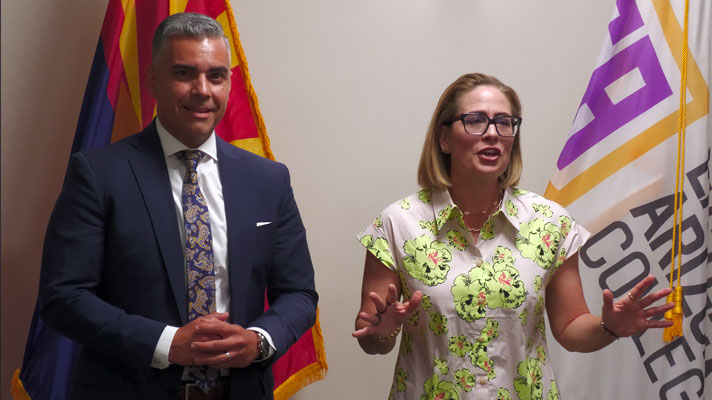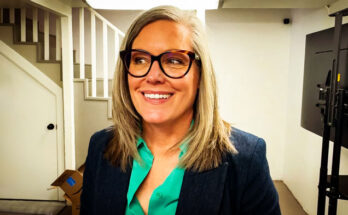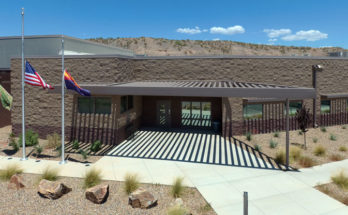Jon Johnson Photo/Gila Herald: Rep. Juan Ciscomani (R, LD-06) and Sen. Kyrsten Sinema (I) held a roundtable discussion with local leaders at EAC on Thursday.
By Jon Johnson
THATCHER – For the second year in a row Senator Krysten Sinema (I) held a roundtable meeting with local leaders. This time, Sen. Sinema was joined by freshman Rep. Juan Ciscomani (R, LD-06), and the event was hosted by Eastern Arizona College and its president, Todd Haynie.
The meeting was held in the executive boardroom at EAC and featured those involved in city, town, and county government for municipalities and communities in both Graham and Greenlee counties. One of Sinema’s most prolonged hugs on her arrival at the event Thursday was for Greenlee County Board of Supervisors Chairman Richard Lunt, who has known her since her days serving in the state legislature.
One thing that has changed for Sinema since last year’s meeting is her political party affiliation switch from Democrat to Independent. While on first blush one might think it a bit bold and unusual to run as an Independent but for Sinema and Arizona it seems to fit.
Sinema – in some aspects like stalwart Republican maverick John McCain before her – has stood her ground for her beliefs regardless of political party pressure – and has shown the ability to cross the aisle and get work done with Republicans. And as for a three-way race for the coveted Arizona Senate seat, being an Independent might not be a bad position to come from.
According to the Arizona Secretary of State’s website, as of July 2023, Arizona has 1.45 million voters (34.55%) registered as “other”, which is the largest group, followed by Republicans with 1.44 million voters (34.42%) and Democratic with 1.26 million voters (30.02%).
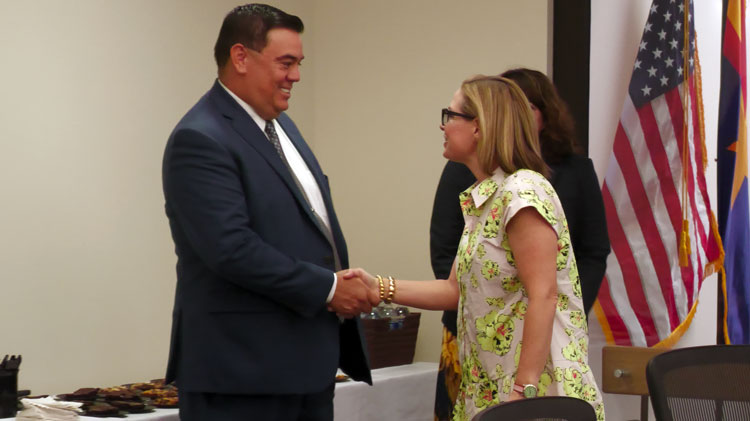
So, with that Sinema made her way back to Graham County on Thursday and Rep. Juan Ciscomani met her at the college.
“I’m also really excited to be here today with my friend and partner, Juan Ciscomani,” Sinema said. “He is, as you all know – in his first term in Congress – has just been an incredible partner in delivering results for Arizona.”
“From border security to the economy to energy, to the environment, these are all things that are important to both of us, especially in this district that is so unique,” Ciscomani said.
The legislators and special guests were warmly welcomed by President Haynie, who gave a brief overview of the college before yielding his time to the senator.
“One of my guiding principles for the college is community engagement and that’s what this roundtable discussion represents is an opportunity for us to engage with our community,” Haynie said. “So, we would like to welcome all of you to campus.”

After thanking everyone for traveling to Thatcher for the meeting, Sinema gave a summary of some of the projects she’s been working on, including the formation of a rural development working group, the Bipartisan Infrastructure Law and how it impacts rural Arizona – including $1 billion for broadband high-speed Internet throughout the state, and border security.
“In every single community that I travel in Arizona I hear about this concern,” Sinema said. “Every community in Arizona is a border community.”
To wit, Sinema said she made sure to have the Border Patrol Enhancement Act – which increases overtime pay for Border Patrol agents – included in the Senate version of the National Defense Bill which passed the Senate last week, as well as the Securing America’s Ports of Entry Act, which increases the number of Border Patrol officers nationally by 600 a year for the next five years, for a total of 3,000 new officers.
“That’s going to make a real difference for boosting border security, pay, ensuring that we can recruit and retain the best officers and pay for overtime work, and, of course, hire more officers to help us throughout Southern Arizona,” Sinema said.
Sinema also spoke about two acts targeting the Mexican cartel. The Fend off Fentanyl Act she co-sponsored was included in the National Defense Bill and targets cartel money, and the Combating Cartels on Social Media Act, which she is the lead sponsor in the Senate and Ciscomani is the lead sponsor in the House of Representatives. She said the bill will allow law enforcement to work with social media companies to crack down on those soliciting the youth to serve as get-away drivers for human and drug smuggling and remove such ads. Young people are being swayed on social media sites into serving as drivers and have inevitably been in several police chases and crashes through Graham County as they take loads of people from the Douglas area to the Phoenix area.
“This is occurring every single day in rural communities throughout Arizona,” Sinema said. “It is incredibly dangerous. So, I’m really proud that the bill that I sponsored in the Senate and that Juan sponsored in the House was successfully included in the defense bill that we passed last week.”
“Right now, the government has no power or authority to do anything to take down that recruitment from cartels like the Sinaloa. Our bill is halfway to the finish line. Our job is to get it all the way to the finish line; get it to the president’s desk so that he can crack down on these cartels and save the lives not just of these teenagers but of the community members who are in danger because of these high-speed chases.”

“The average age of teenagers that we see on this are 14, 15, 16-year-olds,” Ciscomani added. “I’m a dad of six. I have kids that age. I can’t imagine what parents have gone through; what kids themselves have gone through on this. You have inexperienced drivers driving at high speed with guidance that is misled by the cartels. This is dangerous all the way through. This is why that bill tackles that. To make sure we have communication with the social media companies. They (social media companies) have all the information. They need to be communicating that to law enforcement so that we can interrupt that nasty system they have going on. (sic)
The actions combating fentanyl hit home for Safford Mayor Jason Kouts, who lost his son, Josiah Kouts, to a fentanyl-spiked heroin overdose on Jan. 23, 2018. Kouts presented a book and documentary film about Josiah to the legislators as gifts and thanked them for their work in the area of fentanyl eradication.
Like Sinema, Ciscomani also has an advisory council made up of local members to help keep him abreast of local issues and, as has a seat on the House Appropriations Committee and Veteran’s Affairs Committee. He, along with Sinema and Rep. Ruben Gallego (D, LD-3), recently released a joint statement regarding Davis-Monthan Air Force Base being chosen as the site for the new 492nd Special Force Power Projection Wing, which will include light attack and transport aircraft.
Locally, Ciscomani has “secured” $2 million for a new Pima Fire Department; $1.8 million for wells and pipes for Western Rural Water and the Central Arizona Irrigation District; $1.3 million for the Gila River Linear Park; $859,000 for upgrades to the Northern Cochise Community Hospital in Willcox, and $274,000 for the town of Duncan to mitigate flood issues in the Hunter Estates development.

After their introductions, Sinema and Ciscomani listened to the community leaders express the problems they are facing and how to help solve the issues. A variety of examples were discussed, including infrastructure and transportation issues, Internet connectivity, lack of affordable housing, scholastic programs, and more, but the most common theme was the availability of water.
“We need you to fight like hell for the water,” said Safford Mayor Jason Kouts. “Water is (the) bloodline for the entire (Gila) Valley.”
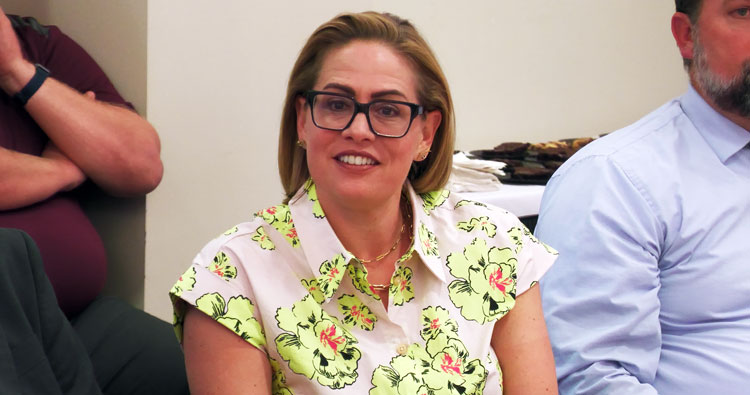
Kouts was referring to the longstanding water issues between the Gila Valley and San Carlos Apache Tribe. He said he feels community leaders could make significant headway in water discussions if the Tribe’s attorneys would just let the two groups talk to each other by themselves.
“If you could get us in a room without attorneys for the water, I’ll love you to death,” Kouts said.
Sinema has been essential in forming a water caucus of the seven states who utilize Colorado River water to work together regarding that water source and said she gives her personal commitment to try and get the opposing sides to work together for the betterment of everyone.
“Water is our future,” Sinema said. “We’ve got to work together . . . A short-term victory over each other is a long-term loss for all of us. We’ve got to work together.”


